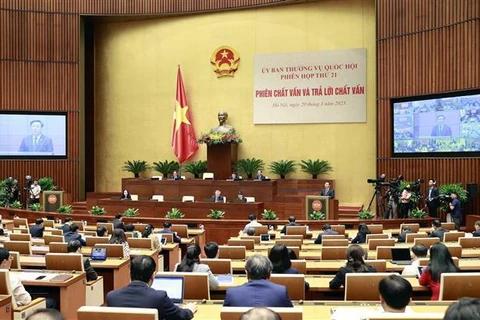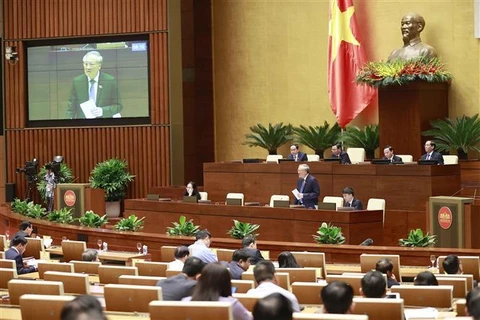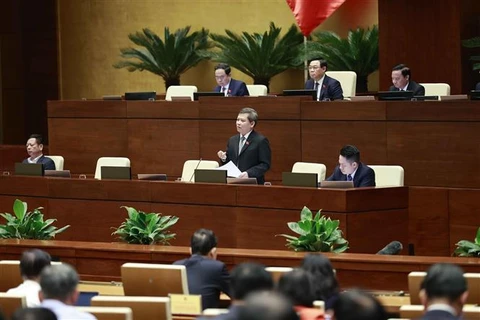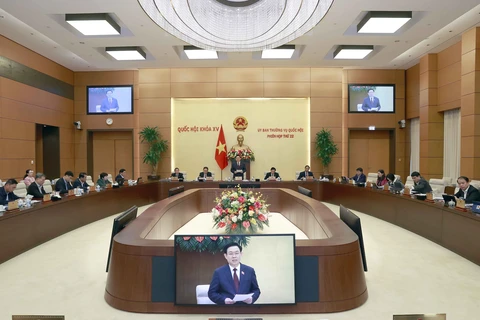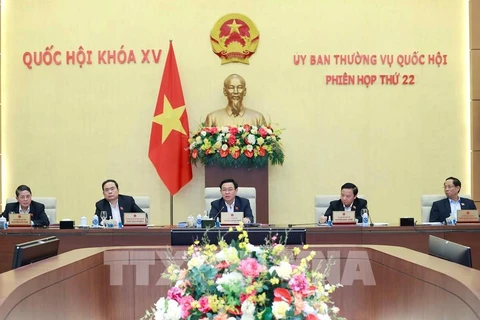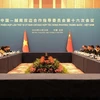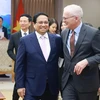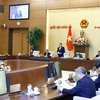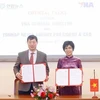Hanoi (VNA) – More than 236 trillion VND (10 billion USD) had been mobilised to directly serve the COVID-19 prevention and control as of December 31, 2022, according to a report by a National Assembly (NA) supervisory delegation.
Results of the NA delegation’s supervision over the mobilisation, management, and use of resources for the pandemic combat, along with the implementation of policies and laws on grassroots health care and preventive medicine were discussed at the ongoing 22nd session of the NA Standing Committee on April 11.
Presenting the report, Chairwoman of the NA’s Committee for Social Affairs Nguyen Thuy Anh, deputy head of the supervisory delegation, said that of the mobilised sum, over 189 trillion VND came from the state budget and the rest, from donation (mainly vaccines) and sponsorship sources.
More than 15.1 trillion VND was raised for the COVID-19 vaccine fund. Meanwhile, Vietnam received nearly 160 million doses of donated and sponsored vaccines, including almost 150 million doses worth about 24 trillion VND donated by other countries’ governments.
Millions of volunteers, especially health professionals and members of armed forces, directly worked in the frontline. People of all social strata, enterprises, the Government, and international organisations contributed efforts as well as assistance in cash and in kind to the pandemic fight.
The management, use, and payment for resources mobilised for the COVID-19 combat were basically carried out in line with regulations.
Results of the NA delegation’s supervision over the mobilisation, management, and use of resources for the pandemic combat, along with the implementation of policies and laws on grassroots health care and preventive medicine were discussed at the ongoing 22nd session of the NA Standing Committee on April 11.
Presenting the report, Chairwoman of the NA’s Committee for Social Affairs Nguyen Thuy Anh, deputy head of the supervisory delegation, said that of the mobilised sum, over 189 trillion VND came from the state budget and the rest, from donation (mainly vaccines) and sponsorship sources.
More than 15.1 trillion VND was raised for the COVID-19 vaccine fund. Meanwhile, Vietnam received nearly 160 million doses of donated and sponsored vaccines, including almost 150 million doses worth about 24 trillion VND donated by other countries’ governments.
Millions of volunteers, especially health professionals and members of armed forces, directly worked in the frontline. People of all social strata, enterprises, the Government, and international organisations contributed efforts as well as assistance in cash and in kind to the pandemic fight.
The management, use, and payment for resources mobilised for the COVID-19 combat were basically carried out in line with regulations.
Based on the pandemic situation and demand in reality, donations and sponsorships were allocated in a timely manner while recipients managed and used the support properly, Anh noted.
Regarding the implementation of policies and laws on grassroots health care and preventive medicine, she said the grassroots heath network has expanded across the country. By the end of 2022, all districts nationwide had medical centres, and 99.6% of the communal-level localities had clinics, with 92.4% of the clinics having doctors.
The report also highlighted improvements in the quantity and quality of medical personnel, health service supply and quality at the grassroots level, as well as people’s satisfaction of medical personnel’s performance and service quality.
Pointing out certain problems and shortcomings, the supervisory delegation asked the Government, the Prime Minister, the Vietnam Fatherland Front Central Committee, and related parties to draft some new laws such as one on disease prevention or another on the state of emergency, or propose revisions to existing ones like the ordinance on emergencies and the health insurance law.
It also called for building a master plan on response to emergencies and continuing to implement the solutions issued by the NA and the NA Standing Committee to address obstacles to the mobilisation, management, and use of resources for the COVID-19 fight.
Regarding preventive medicine, the delegation recommended the grassroots healthcare and preventive medicine systems be consolidated, training increased for grassroots health workers, and policies promulgated to ensure appropriate salary and allowances for those at the grassroots level./.
Regarding the implementation of policies and laws on grassroots health care and preventive medicine, she said the grassroots heath network has expanded across the country. By the end of 2022, all districts nationwide had medical centres, and 99.6% of the communal-level localities had clinics, with 92.4% of the clinics having doctors.
The report also highlighted improvements in the quantity and quality of medical personnel, health service supply and quality at the grassroots level, as well as people’s satisfaction of medical personnel’s performance and service quality.
Pointing out certain problems and shortcomings, the supervisory delegation asked the Government, the Prime Minister, the Vietnam Fatherland Front Central Committee, and related parties to draft some new laws such as one on disease prevention or another on the state of emergency, or propose revisions to existing ones like the ordinance on emergencies and the health insurance law.
It also called for building a master plan on response to emergencies and continuing to implement the solutions issued by the NA and the NA Standing Committee to address obstacles to the mobilisation, management, and use of resources for the COVID-19 fight.
Regarding preventive medicine, the delegation recommended the grassroots healthcare and preventive medicine systems be consolidated, training increased for grassroots health workers, and policies promulgated to ensure appropriate salary and allowances for those at the grassroots level./.
VNA


